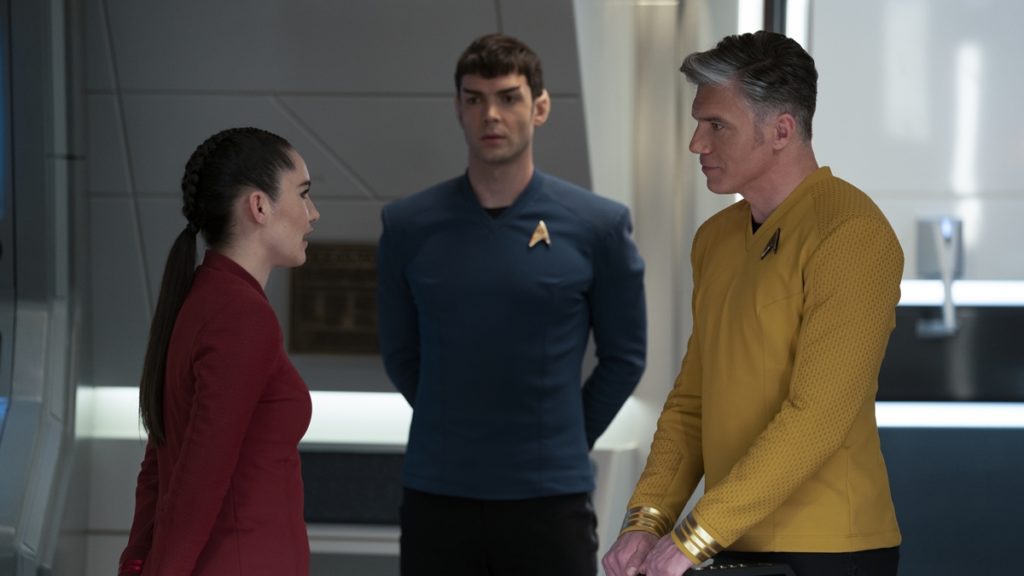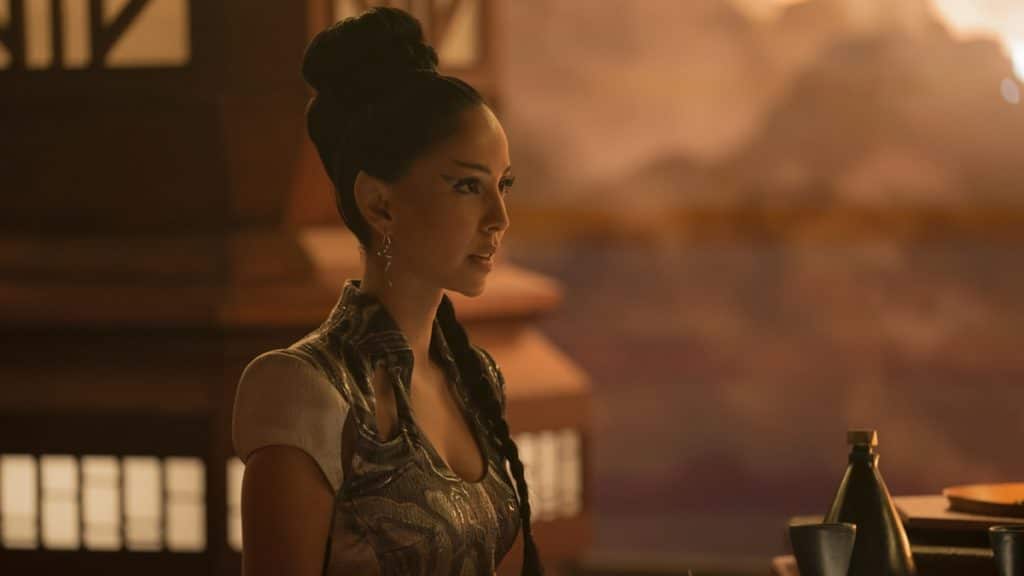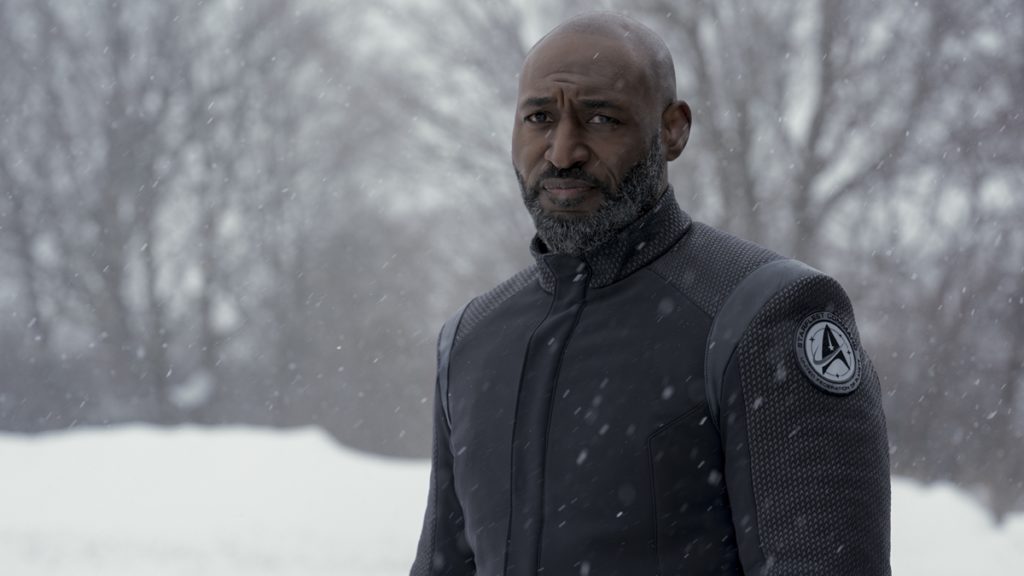Read also:
How to Watch FX Live Without CableHow To Watch AMC Without CableHow to Watch ABC Without CableHow to Watch Paramount Network Without CableTime-tested tropes mixed with contemplative tales and a strong cast liven this new throwback.
The things you know and love about Star Trek are all here from the jump.
The famous mission statement. The familiar musical sting. The intro where a Starfleet vessel wends its way through space. The flagship blasting off earlier than planned. The crew scrambling without enough time to prepare. The senior officer trapped on some alien world. The spirited but intellectual boardroom debate. The personal issue that just so happens to dovetail thematically with the crisis of the week. The chance to disguise an away team for an “infiltrate and rescue” mission. The first contact escapade gone awry. The captain who declares, “Damn the rules, I’m doing what’s right!” The grand speech that persuades a skeptical people to see the bigger, more merciful picture. And the voiceover that sums it all up, followed by a renewed determination to keep exploring.
These are the rhythms Trekkies have loved and embraced for ages now. Shows like The Original Series and The Next Generation weren’t procedurals exactly. But they did have familiar tropes and story shapes that recurred over and over through the franchise’s first forty years. Star Trek: Strange New Worlds revives these classic elements for its maiden voyage and beyond, updating them to fit modern sensibilities.
That extends to the officers on deck. Captain Pike (Anson Mount), Mr. Spock (Ethan Peck), and Number One (Rebecca Romijn) reprise their roles from Star Trek: Discovery. Working alongside them are other major players from the 1960s show like Uhura (Celia Rose Gooding) and Nurse Chapel (Jess Bush). SNW even brings back less prominent but technically preexisting characters: Dr. M’Benga (Babs Olusanmokun), a rarely seen substitute for; Dr. McCoy; Transporter Chief Kyle (André Dae Kim), a recurring extra on Kirk’s vessel; and T’Pring (Gia Sandhu), Spock’s fiancée.

The only original characters who play a significant role in the early going are Lt. Ortegas (Melissa Navia), who’s brand new, and Lt. La’An Noonien-Singh (Christina Chong), who nevertheless shares her heritage with the infamous Khan.
Despite the series’ title, there’s not a ton that’s new in its opening bow. A set of mostly-known characters mans the starship Enterprise and aims to explore the galaxy on a five-year mission. The premiere is a standalone adventure, like those of old. But for the flashier effects and slicker sets, fans might mistake the plot of this initial installment for something pulled from one of the 1990s series.

There’s nothing wrong with that, though. The writing here is superb. The actors are charming. The characters have great chemistry. The predicaments du jour offer challenges both practical and philosophical. The crew of Pike’s Enterprise, traversing the quadrant years before Kirk’s, seem poised to venture into the unknown, have fun doing it, and discover both what’s out there and what’s within.
The familiarity at play isn’t a sin. There’s a reason the franchise’s creative luminaries returned to those time-honored techniques again and again. The series’ introduction and its tale of first contact gone wrong with a society much like that resembles Earth’s past may not be groundbreaking for Star Trek. But these are study elements, and it’s soothing to see them deployed once more with such gusto.
What distinguishes this first episode is the same thing that distinguished dozens of similarly-conceived installments of the older series it borrows from: the specific themes and characters at play. The version of Christopher Pike we meet here is not the self-assured leader who temporarily helmed the Discovery, or even the burned-out commander fans saw in “The Menagerie” in 1966. Instead, he’s a hollowed-out officer shaken by seeing a vision of his own death. The grim prophecy leaves him wondering if his actions truly matter and if knowing when and how he dies will change how he acts now.
Star Trek: Strange New Worlds revives these classic elements for its maiden voyage and beyond, updating them to fit modern sensibilities.
It’s a canny notion to explore for a series featuring so many characters whose fates are established. Whether a known destination renders the intervening adventures moot is an issue all prequels must grapple with. Making the issue a personal one for Pike, not just a practical one for the show, helps thread that needle.
Better yet, SNW’s premiere reminds viewers why Discovery-watchers clamored for more of Anson Mount’s interpretation of Pike. He feels very human here. The captain is reluctant in the right moments, becomes commanding and supportive in others, and seems low-key yet confident in a way few other commanders have throughout Star Trek’s venerable history. Mount steps into a familiar mold, not just for Pike specifically, but for the noble figure who’ve strolled the bulkheads of Starfleet flagships past. Thankfully, though, he puts his own spin on the archetype in the series’ early going.
That includes Pike’s appropriately philosophical meditations on how witnessing your own death might change you. Spock chimes in, naturally, on how the knowledge that everything must end is an essential part of command and life itself. These types of exchanges allow the episode to focus on its character beyond the adventure of the week. Pike, Spock, La’An, and the audience all have a chance to compare notes and consider whether fear of death or rather acceptance of it puts one in the right state of mind.

But the personal connects to the political (and intergalactic) in the crisis du jour. Thanks to the top-secret battle from the end of Discovery’s second season, a pre-warp society witnessed Federation vessels in action and reverse engineered warp technology. Unfortunately, they want to use it for bombs to help settle a centuries-old planetary war rather than take the opportunity to join the interstellar community. The thing that chastens them, and makes them consider Starfleet values, is a glimpse at Earth’s bleak consequences in a similarly tense technological moment Pike’s velvety speech on what humanity lost before it found its way again doesn’t hurt either.
The course change that speech represents is striking. So much of Star Trek is aspirational, a vision of humanity bettering itself to serve as an example people in the real world can aspire to. This episode balances that optimism with a dire warning, drawing a straight between current schisms and simmering tensions in modern America to the decimation of the Eugenics Wars and World War III in this fictional universe. In its opening salvo, SNW doesn’t merely present a sterling example worth emulating. It also offers a grave caution: to the warring pre-warp factions on the screen and to the viewers at home.
That tack is a strong one. A vision of harsh consequences can spur us to make the best, and most, of the opportunities available. And those who work to preserve the good in the darkest hours may see it blossom when the time is right.
Pike’s parable about how efforts to preserve the biospheres of Earth prior to nuclear war resulted in the first Starfleet base is a little cheesy. This factoid comes with the sort of sweeping oratory captains like Kirk, Picard, Sisko, and Janeway made famous. But it remains stirring to hear one of those time-tested captain’s speeches, acknowledging the difficult moment of the present while suggesting it too can be a wake-up call to work for the future so many young Trekkies dreamed of.

As outstanding as Strange New Worlds’ initial batch of episodes is, the worry is that it won’t go far enough in advancing what Star Trek can be as the franchise nears its sixth decade. There’s something to be said for giving the fans what they want. The likes of Discovery, Picard, Lower Decks, and Prodigy have all balanced a certain reverence for past stories and characters with dramatic differences and shake-ups in the style and approach. By contrast, Strange New Worlds is easily the most traditional show of the bunch. In many ways, it’s the series some fans expected and then demanded Discovery be — a straightforward refresh of the old ways with an updated aesthetic
Therein lies the concern. Trying to placate the unyielding elements of the fandom with reassuring throwbacks to what they already know and like can net you disappointments like Rise of Skywalker or, heaven forbid, Star Trek: Enterprise. The promise of James T. Kirk’s arrival in a later outing, and the presence of his mustachioed brother here, suggest the new series won’t shy away from tying itself to every piece of Original Series ephemera it can wrangle. Giving into fans who bristle at change or, god help them, balk at greater diversity in new stories, can feed the wrong parts of the fanbase and lead to creative stagnation.
And yet, with a record five Star Trek series in production at the same time, variety is a good thing. In the wake of a serialized big-budget drama, a blockbuster legacy sequel, a raucous referential comedy, and an adventurous kid-friendly show, there’s room for something more traditional and episodic on the menu for those ready to harken back to the old days.
Nevertheless, with its outstanding cast and excellent writing, this series is a breath of fresh air. The melodies Strange New Worlds plays may not be completely novel, but its rendition of them is marvelous, with just enough turns and flourishes to feel distinctive. That fills a need too. As with Pike himself, there’s reason to hope this new series will make its mission worthwhile, regardless of a known destination.